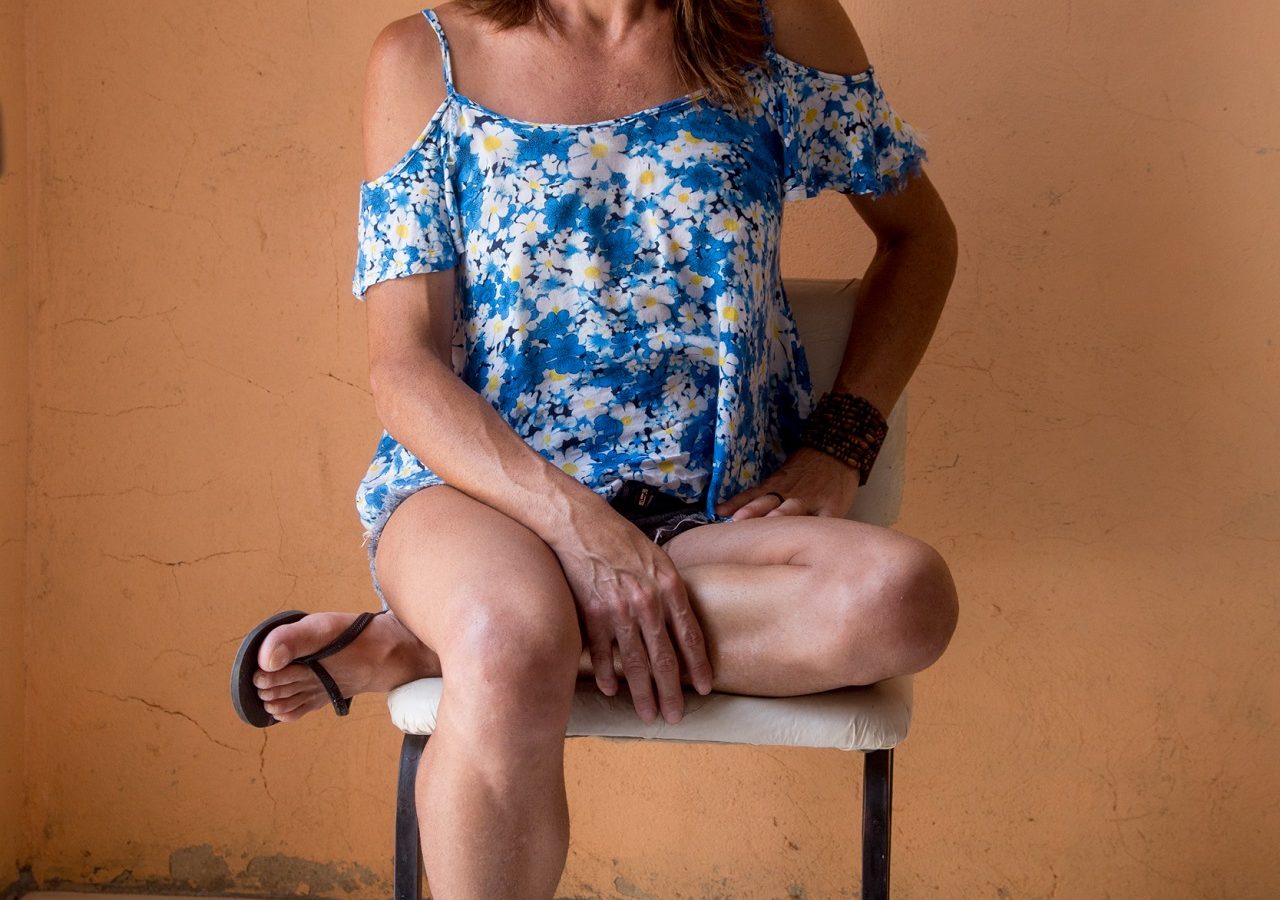
“I Could Be Killed Any Moment”: The Life of Trans People in Brazil

Documentary photographer and journalist from St. Petersburg. Has a degree in Journalist from St. Petersburg State University, studied in Mikhail Domozhylov’s documentary photography school. Published her work in National Geographic, Lenta.ru, Mediazone, Discovery, and Russia Beyond the Headlines.
— Brazil is a country where a sex change operation is a constitutional right of every person. Since 2007, the operation has to be performed for free and be a part of a standard medical care package. This decision was made to ensure healthcare and privacy for citizens.
At the same time, Brazil has ranked first in the number of murders of trans people in the world for several years now: only in 2017, 171 out of 325 such murders happened in Brazil. What is life like for trans people in the country where, on the one hand, they are protected by law, and on the other, they constantly face danger and isolation from society? And what does the future hold for them, as the new president, Jair Bolsonaro, has an openly homophobic stance?
Jacqueline Gomez de Jesus
Age 39
In 2017, became the first black trans woman to receive the Chiquinha Gonzaga medal — an award of merit in law, culture, and art. In 2018, Jacqueline was a candidate from the Workers’ Party in Rio de Janeiro during the 2018 election.
Transphobia is natural for Latin Americans.

— Almost my entire life was connected with academia: I have a PhD in Social Psychology, teach at the university, and am a human rights activist. For my entire life, I was fighting discrimination and advocated for human rights. My education and social status allowed me to avoid many problems that trans persons are facing nowadays: I haven’t encountered as much aggression as I otherwise would have. I was supported by both my family and my colleagues. At the age of 29, when I fully understood who I was, I ended the relationship with a man I was with at the moment. My first husband was shocked, as he married a man, but it turned out that the entire time he lived with a woman.
I am convinced that the relations between transgenders and society largely determine our future. Unfortunately, transphobia is natural both for Brazilians and for Latin Americans in general. In society, everybody is focused on the issue of violence and forget about people’s civil rights. And right now the country is at a turning point. We are discussing legislation that would allow the use of the so-called ‘social name’ — the name that the transgender chooses as the one that most reflects their identity and that is usually different from their officially registered name. Now, many institutions allow the use of social names, but it is important that it becomes a law, which is equal for everybody. The lack of necessary documents leads to 90% trans people having to work in prostitution. Not many are able to find an alternative.
Alessandra Ramos
Age 36
I may be killed in the street in any given moment.

— I was raised at the Jehovah’s Witnesses church, where I learned Brazilian sign language, which later helped me to become a professional sign language interpreter. I left the church at the age of 21, when I started the transition. For a long time, people refused to hire me. And although I am highly qualified — in addition to sign language, I know English, Spanish, Italian, and French — the only reason to refuse has always been the inability to accept who I am.
Being not only a person who changed their sex, but also a black person, I am in two at-risk groups. I know that I may be killed in the street at any given moment, and generally speaking, it may be dangerous even to answer a verbal insult in a supermarket. Now, we become visible, it is easy to find information about a person on the Internet, they may be traced and killed. Social unacceptance complicates the situation.
It is important for me to help people who are in similar circumstances: I have worked in the sphere of LGBT rights since 2000. Thanks to my advocacy activities, today I work as an advisor to congressman Jean Wyllys. However, when I just started to accept myself and to transition, I had to go down the same road as many here have: I earned my living with prostitution to survive.
Kaike Teodoro
Age 23
I was literally stoned.

— I transitioned five years ago. It was a very difficult period, I constantly faced aggression, I was humiliated and literally stoned. I am still afraid to walk the streets alone, although the situation in the country is better than it used to be several years ago. However, the problem with social acceptance still remains. If you are transgender, it is very difficult to find official employment, and everybody just does what they can. I earn my living as a street musician and model at an agency for trans people. I am lucky to be accepted and supported by my family.
Jordan Lessa
Age 50
My rapist screamed: “I’ll show you, what a real man does!”

— I felt that I was a boy since I was a child. I thought that I would eventually become one with time.
Nobody wanted to be friends with me at school. And at 12 I found out that I was adopted and left home — dropped out of school and started living in the streets. At 16, I was raped. I remember that guy screamed: “I’ll show you, what a real man does!” I got pregnant, and I decided to have the baby. I raised my son alone, he is now 33.
The attitude toward me changed only after I published a book about my life in 2014. I medically transitioned to a male body only four years ago, and it is only now that I feel in place.
I eventually graduated from school and found a job. Today, I have an official job as a guard at the city hall. I was lucky, buy I haven’t had a single raise in 19 years. It is very uncommon for a trans person to have an official job in Brazil. The city authorities do everything they can — only last year, they helped 70 people with employment, and four of them work together with me. I think we can’t make everybody love each other, but we can make them respect each other.
Gilmara Cunha
Age 33
In 2015, became the first trans person to receive the Tiradentes Medal — the highest award issued by the Legislative Assembly of Rio — for her work in the favelas.
I thought that the church would destroy all these wishes in me.

— Rio’s favelas are a lawless land. No matter what laws are passed in Brazil, there is not the slightest chance that here in the favelas anybody would be punished for aggression. All that there is left is to change the mindset, to fight the existing prejudice.
My entire life is here, in the Mare favela. I was born in a rather conservative family. When I was thirteen, my homosexuality, as I thought then, started showing, and it eventually brought me to the Catholic Church. I thought that the church would destroy all these wishes in me.
It was as if I couldn’t find where I belonged, I was an outcast everywhere. With time, I gained better understanding of who I was, and joined the movement against gender discrimination. Later, I decided to start a project that would help LGBT population of the favelas. That was how Conexão G came to life — an NGO that fights for their rights.
Yvonne Correia dos Santos
Age 62
Most trans persons have to resort to prostitution.

— I am a volunteer at Casa Nem house in Rio. It is an abandoned building in the city center that gives a home to transsexuals, gays, and lesbians in difficult circumstances. It is known that most trans persons today have to resort to prostitution as they can’t find another job. Casa Nem is the last stronghold of support for such people: anybody could come here and be sure that they will be accepted. I work here as a volunteer because I know from my own experience how important this is: I used to be a prostitute myself.
I guess there are no people here who wouldn’t have faced violence or aggression, and I am not an exception — such is the everyday life of Rio. However, I was lucky to have support: my family supported me during the transition.
I was officially married, but I have been a widow for 25 years now. I spend most of time helping here. Today, the fate of Casa Nem is very uncertain: nobody knows, for how long we will be able to keep the house and for how long it may serve the shelter for those in need.
Isabel Santos de Oliveira
Age 22
Today, the image of a trans person is coming out of the shadows.

— I left home at 16, because my parents refused to accept me. Later, they understood me, and our relationship improved, but now I have a boyfriend whose family doesn’t approve of us being together.
I transitioned two years ago, and it wasn’t easy. Because of the sex change, I was fired from McDonald’s where I had worked for four years. It was a shame, I really liked working there. I now work in a cafe in a museum, and everything is more or less okay.
People are often rude to me: for example, I once got on a women-only subway car, and a woman standing beside me immediately told me rudely that I couldn’t be there. And this is not the biggest problem — we are afraid to walk the streets, as you never know who gets killed next.
I want to believe that the situation will change and the attitude of the society will change for the better. Today, at least, the image of a trans person is coming out of the shadows: we have stars and characters of TV shows who went through a sex change.
Maria Eduarda Aguiar
Age 36
People call asking for help 24/7.

— I am a lawyer by profession, but I always wanted to have some kind of a social job where I would help transgender people. This was how I met Pela Vidda group who work to counter the problem of HIV/AIDS. Today, I work with those who are in the most vulnerable state — people call asking for help 24/7.
Now I have an opportunity to help others, but at some point I was struggling with transitioning myself. My mother did not accept me for a long time, she didn’t see a difference between a trans person and a homosexual; she would have been more satisfied with the second option, as long as I adhered to the standards of appearance. Eventually though, she did support me. When I started the transition, I faced the problem of legalizing a new name: it turned out, there was no definite way to do it. I became the first lawyer in Brazil to ask to pass legislation regarding a social name.
I think that if people were in equal conditions there would have been no crime. And providing trans persons an opportunity to work would have saved them from the stigma of being marginalized. I can feel aggression every day: one time, I was walking down the street and someone hit me in the face without any warning. The next punch may be deadly — nobody is safeguarded against that.
Esther Morganna
Age 52
I am not allowed to talk to teenagers about transgenderness.

— I am not a trans person, but intersex: from birth, my body has had features of both sexes. Simply speaking, I have a tiny penis between my labia, but I have never had any problems either with gender identity, or with documents: I have always considered myself a woman. I would want to have a surgery, but it is hard for me to collect all the necessary documents and receive permission.
I was married to a Muslim from Lebanon, but I am now divorced. When it comes to aggression, this is Brazil, aggression is in the air here. I was shot at when I was 14, I am not sure why.
I am now working with LGBT teenagers who are struggling with self-identification. And it is complicated by the fact that I have no right to talk about transgenderness to someone who is underage. We are in a difficult position: on the one hand, such a child needs support, and on the other — there is no possibility to openly talk about his or her identity.
John Williams de Oliveira Mesquita
Age 26
I believe that the situation improves with time.

— I am in two at-risk groups: as a Black person and as a transgender. I graduated from university and now work as a lawyer’s assistant, but it was very difficult to find a job. Besides, I experienced sexual violence at my workplace, and I know how other people in such situations feel.
All I want is to help people in difficult circumstances. Because most transgenders today live in poverty and social isolation, having no access to education, healthcare, or professional activities. I actively take part in projects created by Rede Trans Brasil — a network that advocates for transgender rights.
I believe that the situation improves with time, as there are active actions in the social sphere: trans people stop being invisible.
Diana Conrado
Age 21
My grandma supports me, but my mother doesn’t accept me.

— I am a third-year university student. Getting accepted to university is not a big problem for trans persons: a social name is accepted, the university itself has transgender lecturers, which would have been impossible ten years ago.
Outside the university is where the problems start. From my appearance, they take me for a woman and everything is fine — until I need to show my ID. If you are looking for a job, you would most likely not get hired, because you are trans person. The problem with acceptance is serious not only in the society, but also in our own families: my grandma supports me, but my mother doesn’t accept me.
Andrea Brazil
Age 44
My boyfriend tried to strangle me.

— I think I am more of a transvestite than a transsexual. In other words, I feel comfortable without surgery, but I am always in a female image, and I feel I am a woman. I would like legally become a female, as I have identified as a woman for my entire life.
I am a designer and a hairdresser. I mostly work from home: I cut hair and I make clothes. I helped trans people from Casa Nem — I taught them hairdressing, so that they would have at least some opportunity to earn a living except for prostitution.
I don’t do prostitution, I don’t drink, I don’t smoke, I don’t take drugs and I even don’t go out at night, because it might be dangerous. Every person here suffers from aggression in this or that form. I had to go through everything: from religious attacks to the moment when my boyfriend tried to strangle me.
Rafaela Antunes
Age 31
I was assigned the wrong sex at birth.

— I am an intersex, I was born with features of both sexes. This is primarily a biological parameter, and it is not related to gender identity. Such children usually get assigned one of the sexes and are prescribed corresponding hormones.
My sex was identified as male. As a child, I looked like a boy and received corresponding treatment, “for boys”. Later, it turned out that I was a woman, I had to change hormonal therapy, but my sex on the documents remained the same. Because of that, I could look only for part-time jobs: a salesperson, nanny, or waitress. I was lucky — I now work at the city hall as a coordinator for social projects, and the scariest seems to be behind me. However, like everybody else, I had to go through being beaten as a teenager and my mother not accepting me.
Denise Taina
Age 68
I wasn’t myself for as long as 50 years.

— Denise started showing herself only after my dad died. I could say that I spent 50 years of my life in a closet, not being myself. In a way, Denise is a child, as she came out only recently. It may be the reason that many people today don’t believe that I am as old as I am — they say, I look younger.
I have been a public official in Rio for over nine years — I work in human rights and countering discrimination against the LGBT, and I try to do everything I can to help the others.
I think that all of us need to come out of the shadows. We have groups of transsexuals and transvestites, but we end up communicating only with each other and being isolated from the rest of the world. That’s why, I try to avoid various “ghettos” and even when I go dancing samba, I go to a “hetero” wing. And although I am the only trans person there, it gives me the feeling that I am living a normal life.
When it comes to fear, it is always present in Rio, regardless of who you are. Nobody is safe from robbery or violence. However, our task is to show that we are the same people as everybody else.






